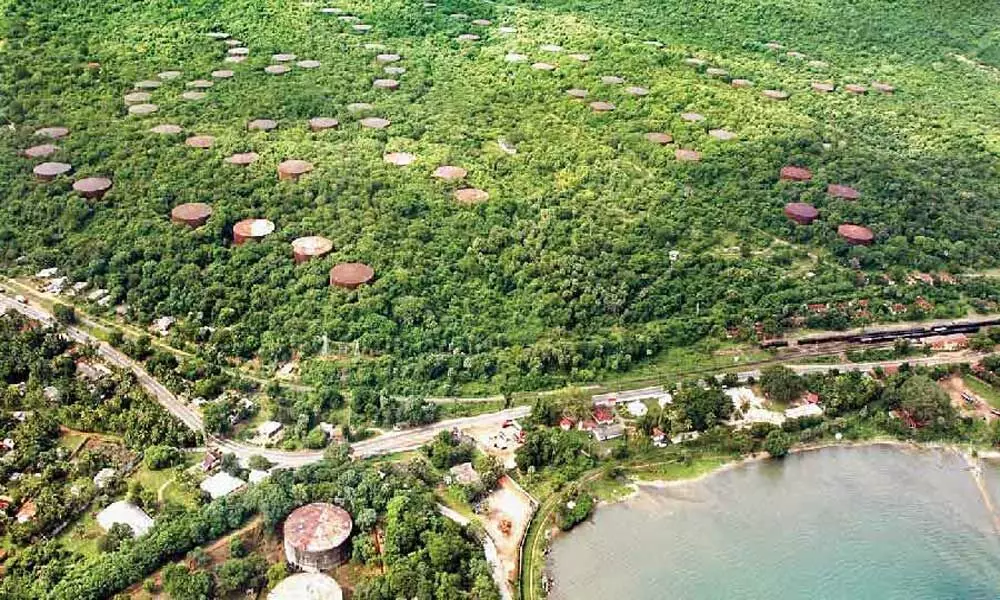India diplomacy checkmates Chinese wolf warriors
Sri Lanka’s Trincomalee oil tank farm deal is timely and of strategic importance for India
image for illustrative purpose

The oil tank farm, which is commonly known as the Trinco Oil Tank Farm, is located on The Trincomalee Harbour, one of the deepest natural harbours in the world where the British used to refuel Allied warships and aircraft during WW-II
New India-Lanka Equation
- Under the joint venture agreement, Ceylon Petroleum Corporation and Indian Oil Corporation will hold 51 per cent and 49 per cent stakes, respectively, in the new entity for a lease period of 50 years
- This strategic Oil Tank complex deal announcement, which has been pending since 1987
- New Delhi shall provide $1.5 billion support to Colombo that would include a credit line to import food, medicines, petroleum products and other essential items from India
- An additional $400 million currency swap to "tide over the current economic crisis caused by Covid-19 pandemic."
Winning the Trincomalee oil tank farm deal, strategically important to India, reflects how Indian diplomacy is adapting to the ever-changing world order.
India and China, the two arch Asian rivals, have been making moves and counter-moves, be it "the Chinese String of Pearls strategy" or India's counter move by way of "Necklace of Diamonds Strategy", to gain the upper hand in securing their respective commercial and geostrategic interests in the Indian Ocean region. Sri Lanka is one of the island nations where "China has been trying to elbow out India to expand its geopolitical influence."
On Tuesday, the Sri Lankan cabinet cleared India's proposal to modernise the Trincomalee oil tank farm located on the island nation's east coast. Based on the three existing pacts between the two countries, India and Sri Lanka worked out a new agreement to jointly develop the World War II-era oil tank farm.
According to Udaya Gammanpila, Joint Cabinet Spokesperson, under the joint venture agreement, Ceylon Petroleum Corporation and Indian Oil Corporation will hold 51 per cent and 49 per cent stakes, respectively, in the new entity for a lease period of 50 years. The oil tank farm, which is commonly known as the Trinco Oil Tank Farm, is located on The Trincomalee Harbour, one of the deepest natural harbours in the world where the British used to refuel Allied warships and aircraft during WW-II.
This strategic Oil Tank complex deal announcement, which has been pending since 1987, comes at a time when "Chinese foreign minister Wang Yi is expected to visit Colombo later this week." Therefore, implementing this agreement, which was penned into the India-Sri Lanka Accord of 1987, is timely and of strategic importance for India.
Sri Lanka is facing an economic crisis, and its relations have soured with China due to the dragon's "growing economic and political influence" in the country. Further, the recent showdown between the two nations
"over a fertiliser deal gone bad after Colombo accused Beijing of sending contaminated organic fertilisers to Lankan farmers" has pushed the Island nation closer to India.
New Delhi shall provide $1.5 billion support to Colombo that would include a credit line to import food, medicines, petroleum products and other essential items from India and an additional $400 million currency swap to "tide over the current economic crisis caused by Covid-19 pandemic."
"India at all times had shown a strategic interest in the Trincomalee tank farm," and the long-awaited breakthrough in the deal has helped New Delhi secure its commercial and geostrategic interest in the region. Srilanka's geopolitically important to India is in the fact that it is the geographical closest nation in the Indian Ocean, and both countries share historical, cultural, and traditional links.
For New Delhi, the Indian Ocean is its strategic backyard and any foreign manoeuvre in the region is interference in India's security and a challenge to its stability.
China considers "Sri Lanka to be a critical link in its vast Belt and Road global infrastructure-building initiative." Thus, over the past decade, Beijing provided billions of dollars in loans to build airports, seaports, power stations and highways across the island nation.
Beijing deployed its new gained economic might to acquire influence and gain control of strategic locations around the globe. Investment across Sri Lanka served dual-purpose, namely gaining commercial advantage for its Belt & Road project and securing geostrategic clout by gaining a foothold closer to India from it could threaten New Delhi's influence in the Indian Ocean.
Chinese investments were never designed to benefit the host nation; thus, eventually, like many nations, Sri Lanka too fell into the Dragon web, which housed an invisible and inescapable debt trap. Moreover, critics had maintained that the "Chinese-funded projects were not financially viable and Sri Lanka" would struggle to repay the loans. As a result, Colombo ended up surrounding the Hambantota port to "the Chinese State-owned company on a 99-year lease to raise $1.2 billion."
However, the dragon's predicatory position was exposed by none other than India, and soon it started to backfire on China. The forthcoming visit by Chinese foreign minister Wang Yi to Sri Lanka is seen as "an attempt to mend fences", but it might be too little too late.
Escalating tensions with China and domestic unrest due to the economic crisis has forced the otherwise pro-Beijing Rajapaksa regime closer to India. While Chinese diplomacy revolves around the aggression of its wolf warriors, Indian tactfulness is based on adaptation to the ever-changing world order. Next week, the formalisation of the agreement between New Delhi and Colombo may seem like a two-all score between China and India. However, a closer look will reveal India has taken the lead over Xi's diplomacy.
(The author is Founder, MyStartup TV)

